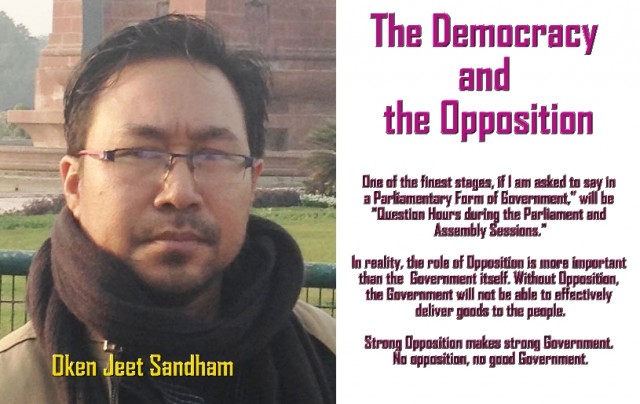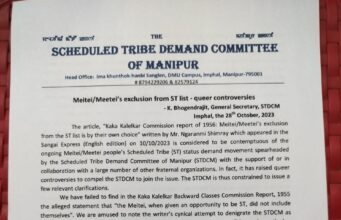By Oken Jeet Sandham
India is, undoubtedly, the largest democratic nation in the world. It has the multi-party system in its democracy. There are many countries in the world where such multi-party systems have been successful in their respective democracies. Brazil, Denmark, Finland, Germany, Indonesia, Ireland, Israel, Italy, Mexico, The Netherlands, New Zealand, Norway, Pakistan, Portugal, Romania, Serbia, South Africa, Spain, Sri Lanka, Sweden, Taiwan and Philippines are also examples of nations that have used a multi-party system effectively in their democracies.
In the last two decades, we had seen how the country (India) was run by an alliance of over 20 political parties while MPs belonging to dozens of political parties played an effective Opposition. Even the present NDA Government is an alliance Government headed by the BJP. The main Opposition Congress and other many parties sit in Opposition.
Democracy is today the most acceptable form of Government of the people, by the people and for the people. The people are supreme in a democracy. They can change the Government if they do not like it. In democratic nations, people can protest, agitate against their governments if they do not like certain systems, policies, and programs. Associations and NGOs can be formed. Freedom of expression is the essence of democracy and it is there in all democracies in the world.
One can criticize the Prime Minister of India on his policies and programs. One can criticize the President of India on his roles if those are against the interest of the nation or certain sections of people or even any individuals as per your views and opinions. You can publicly question or write in mass media on those issues. These are the beauty of democracy and it is continuing in India till today. Article 19 of the Constitution of India gives citizens to assemble and form associations. There is Freedom of Expression.
The Opposition has immense power in a democracy. They can not only question the Government’s programs and policies but also stall many works if those are anti-people programs and policies. They can bring down easily the Government if the latter fails to deliver goods to the people. If there is corruption in the government, they can force them to probe against it or even approach certain institutions to act on it.
In fact, the Government is extremely careful in discharging their duties if there is strong Opposition. If there is a serious crisis in the country, they will consult the Opposition Lawmakers or even leaders of all the political parties to find a solution to such crisis. If there is a serious Bill to be tabled on the Floor of Parliament, leaders of the Ruling will meet the leaders of Opposition parties and discuss in details of the nature of the Bill before it goes to the Parliament.
Some Bills easily sail through while some faces roadblocks because of the opposition by Opposition Lawmakers. There have been debates for weeks and even months, sometimes they could not be passed in the present form. So the Bill has to be redrafted in such way the Opposition agrees. So when crucial Bills are introduced on the Floor of the Parliament, it is for the people of the country. It has to be discussed, deliberated and debated before it is passed as it is for the welfare of the people of the country.
The system of democracy is the same in all the States in India. All the political parties and Independents can contest State general elections and have their Assemblies like the Parliament. There will be Ruling and the Opposition. Bills are introduced on the Floor of Assemblies and they will be deliberated and debated before passing it.
General discussions on Speeches addressed by the President of India in the Parliament or in Assembly by Governor are the essence of democracy as such Addresses highlight the achievements of the Government of the day, its overall performances and it even gives the future programs and policies of the government.
Almost all the Opposition Members normally take part in the general discussions on the Speeches before the reply is given by the Leader of the House. The Opposition questions on achievement reports, programs and policies mentioned in the Speeches and even forces the Government to amend particular Paras in the Speeches. In fact, the Address is the mirror of the Government. That is why Opposition’s participation in the general discussions on the Address is an inseparable part of democracy.
Again, another important area where Opposition’s role comes in is during Budget Session. When the Budget is presented in the Parliament, the Opposition will take part in the general discussion on it and it is the same in Assemblies too. After days of discussions, the Minister-in-charge of Finance will give a reply to each point raised in connection with the Budget. The Minister in-charge of the Railways in India presents its separate Budget in Parliament and there will be general discussions on it.
One of the finest stages, if I am asked to say in a Parliamentary Form of Government,” will be “Question Hours during the Parliament and Assembly Sessions.”
The Government is, as it were, put on its trial during the Question Hour and every Minister whose turn it is to answer questions has to stand up and answer for his or his administration’s acts of omission and commission. Through the Question Hour, the Government is able to quickly feel the pulse of the nation and adapt its policies and actions accordingly. It is through questions in Parliament or in Assemblies that the Government/State Governments remain in touch with the people in as much as members are enabled thereby to ventilate the grievances of the public in matters concerning the administration.
Questions enable Ministries to gauge the popular reaction to their policy and administration. Questions bring to the notice of the Ministers many an abuse which otherwise would have gone unnoticed. Sometimes questions may lead to the appointment of a commission, a court of inquiry or even legislation when matters raised are grave enough to agitate the public mind and are of wide public importance.
The Question Hour is an interesting part of the Parliamentary proceedings. Although a question mainly seeks information and tries to elicit facts on a particular subject, there are many a time lively and quicksilver repartees between the Members asking the questions and the Ministers answering them. These repartees are sometimes coupled with flashes of wit and humor. That is why the public galleries and the press galleries are packed to capacity during the Question Hour.
In reality, the role of Opposition is more important than the Government itself. Without Opposition, the Government will not be able to effectively deliver goods to the people.
In many cases as we have often seen scandals after scandals committed by Ministers and they could not escape from the laws of the land when the Opposition lawmakers started attacking vigorously. At times, the Opposition even demanded the resignation of the Prime Minister for his failure to take actions against his corrupt Ministers.
The Opposition Members are powerful and they can always bring the Government and almost all the Ministries under the scanner. If the Opposition maintains their roles well, the Government cannot stray from its bounden and constitutional duties. Strong Opposition makes strong Government. No opposition, no good Government.












